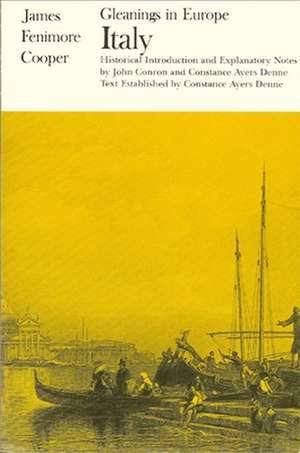Gleanings in Europe
en Paperback – 30 iun 1983
In theory, the picturesque style of writing could produce verbal sketches that embodied a visual complexity similar to that of the great Baroque and Romantic landscape paintings. In practice, the hundreds of travel books written in the picturesque style in the early 1900s communicated rapturous enthusiasm with blurred or even false reports of actual scenes. Cooper, with his scrupulous fidelity to the seen world, intended to alter this practice decisively.
The response of his imagination to the light, color, forms, artifacts and figures of the Italian landscape and to the manifold significances they embody follows in joyful appreciation of the land, culture and people of a country that induced in him the desire to enjoy the passing moment.
In Italy, Cooper refrained from commenting on politics, though he was an incorrigibly political man who responded to an insistent need to define the New World in defining the Old. The independence of his observations drew censure from American reviewers of the 1830s, who could not comprehend that his preference for the Bay for Naples over New York Harbor reflected his intellectual passion to rise above nationalistic feelings in matters of taste, morality and justice.
Preț: 295.85 lei
Nou
Puncte Express: 444
Preț estimativ în valută:
56.62€ • 58.75$ • 47.32£
56.62€ • 58.75$ • 47.32£
Carte tipărită la comandă
Livrare economică 15-29 martie
Preluare comenzi: 021 569.72.76
Specificații
ISBN-13: 9780873954600
ISBN-10: 0873954602
Pagini: 424
Dimensiuni: 153 x 229 x 28 mm
Greutate: 0.7 kg
Editura: State University Press of New York (SUNY)
ISBN-10: 0873954602
Pagini: 424
Dimensiuni: 153 x 229 x 28 mm
Greutate: 0.7 kg
Editura: State University Press of New York (SUNY)
Notă biografică
James Fenimore Cooper (1789 - 1851) was a prolific and popular American writer of the early 19th century. His historical romances of frontier and Indian life in the early American days created a unique form of American literature. He lived most of his life in Cooperstown, New York, which was founded by his father William on property that he owned. Cooper was a lifelong member of the Episcopal Church and, in his later years, contributed generously to it.
Before embarking on his career as a writer, he served in the U.S. Navy as a midshipman, which greatly influenced many of his novels and other writings. The novel that launched his career was The Spy, a tale about counterespionage set during the Revolutionary War and published in 1821. He also wrote numerous sea stories and his best-known works are five historical novels of the frontier period known as the Leatherstocking Tales. Among naval historians, Cooper's works on the early U.S. Navy have been well received, but they were sometimes criticized by his contemporaries. Among his most famous works is the Romantic novel The Last of the Mohicans, often regarded as his masterpiece.
